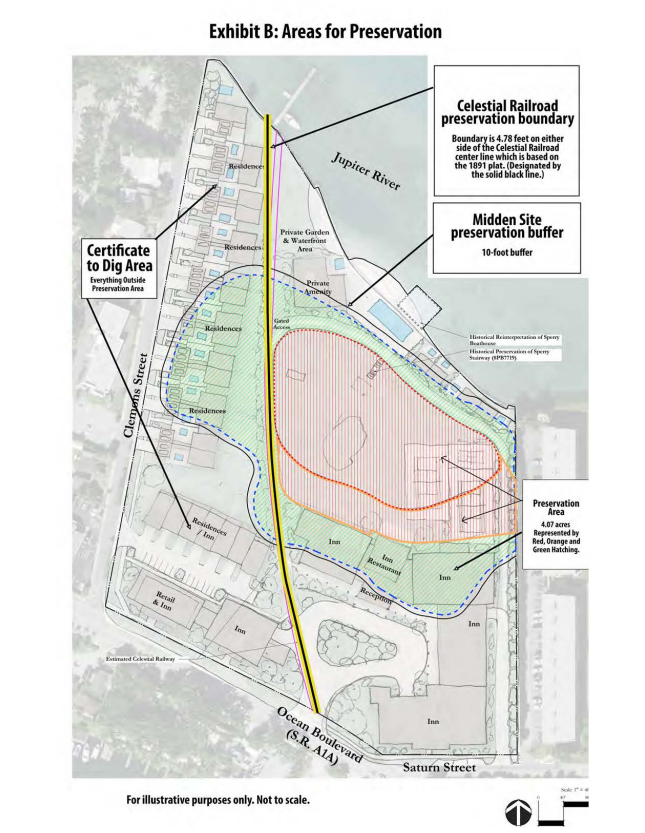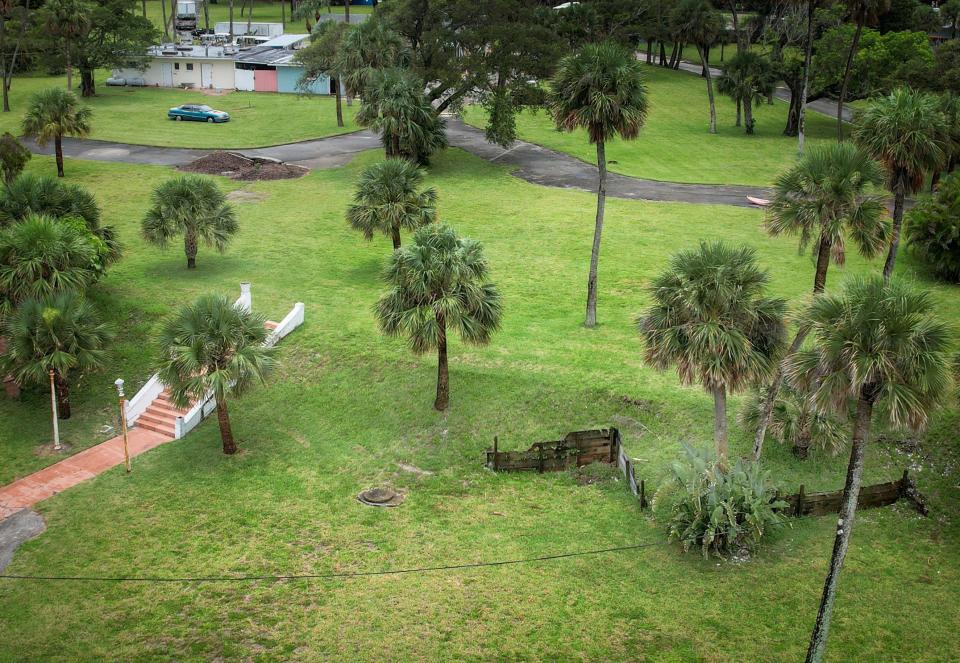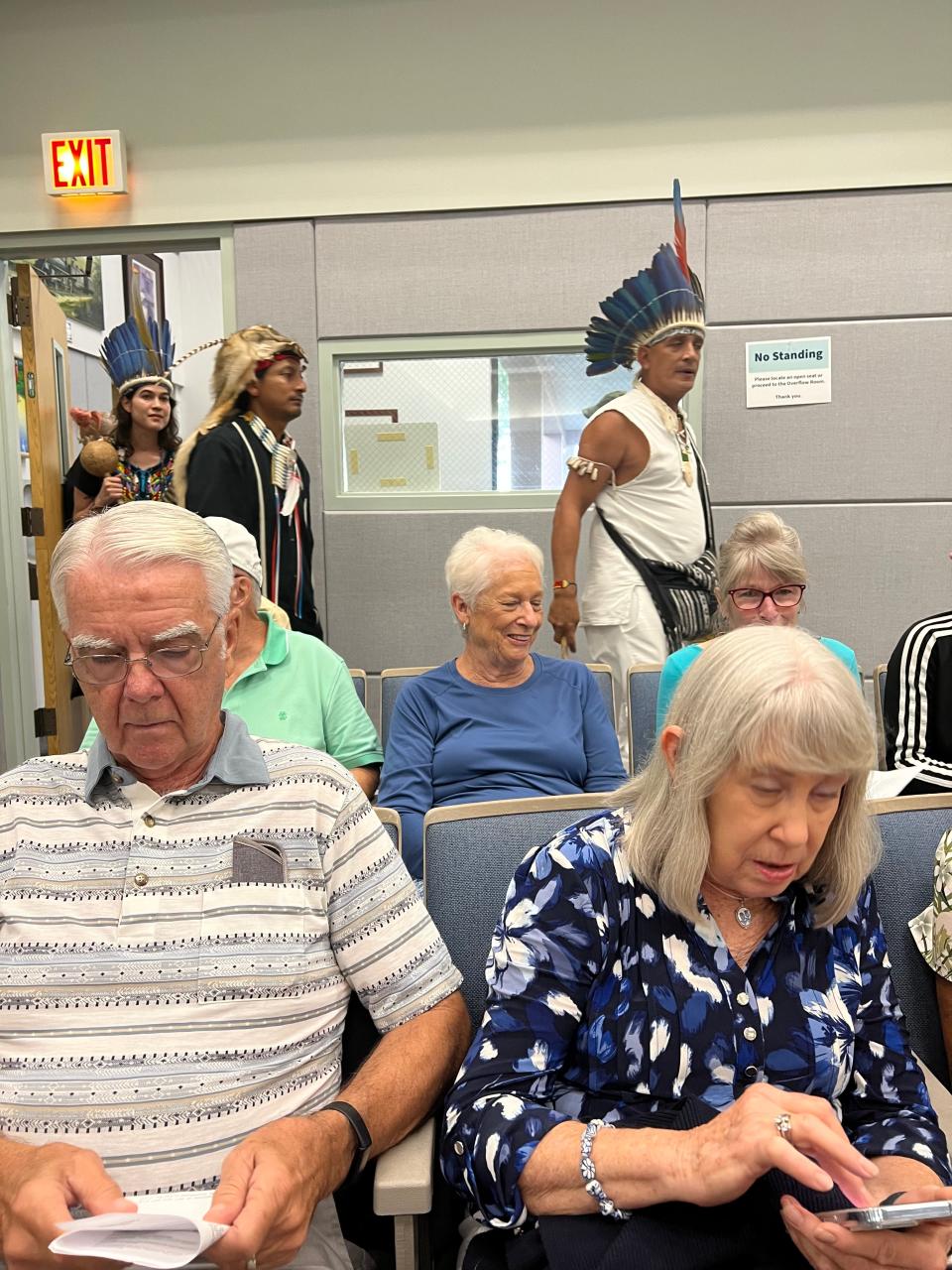How Jupiter is growing: Suni Sands' future in mediation; talks to continue through Dec. 31
JUPITER — The future of Suni Sands, the 10-acre archaeologically and historically significant site near the Jupiter Inlet, remains uncertain after attorneys for the town of Jupiter and a developer who wants to build a hotel and residences there argued before a special magistrate on Thursday.
Following their presentations and comments from area residents who attended the hearing, attorneys met with Special Magistrate Samuel Goren in separate closed-door sessions for three hours.
Goren announced that the attorneys agreed to continue mediation at additional meetings through Dec. 31.
“There was productive conversation on both sides of the aisle,” said Goren, a Fort Lauderdale attorney, stressing that the negotiations are confidential.
Suni Sands: Jupiter: Developer failed to see site's historic importance when he bought it
Suni Sands site was start of settlement that became Jupiter
Most of the commenters who spoke at Thursday’s session at Town Hall said the entire property should be preserved to protect it as well as the sensitive seagrass habitat in the nearby waters. The town has expressed some interest in acquiring the property and preserving it as a park.
“Unfortunately, what we have here is a greedy developer who is willing to go against the wishes of the entire town to build a monstrosity that would be utterly destructive in every way,” said Jupiter resident Kimberly Vanderpol.
In a 3-2 vote on July 25, the Town Council approved a certificate to dig for 6 acres of the property, which sits along the Loxahatchee River. But it set aside for preservation and protection the 4.07-acre Suni Sands Shell Midden, a 10-foot buffer around it, and the 950-foot-long, 9.56-foot wide pathway where the Celestial Railway cut across the property.
The Jeaga and Jobe Indian tribes inhabited the property at least 5,000 years ago. From 1889 to 1893, the property was the terminus of the Celestial Railway, a historic transportation hub. The site was the beginning of the settlement of the town of Jupiter.
The developer, Charles Modica of Jupiter Island, has not submitted formal plans, but has proposed 72 dwelling units, a 125-room hotel and 1,200 square feet of restaurant and retail space at the site at Clemmons Street and State Road A1A.
In 2013, Modica purchased the property, occupied since the 1940s by the Suni Sands mobile-home park, and now vacant, for $17 million. He also developed the Charlie and Joe's at Love Street dining-and-retail complex just west of Suni Sands.
Sea turtles update: Record year for nests in northern Palm Beach County, Loggerhead center says
Suni Sands lawyer: Town's restrictions make site unbuildable
On Thursday, Liana Koslowski, a Miami attorney who represents the property owners, said the restrictions and zoning regulations the council imposed mean that 62% of the property cannot be developed.
“What the property owner is left with is multiple, awkwardly shaped, narrow non-waterfront portions of a property that doesn’t come close to resembling the highly developable waterfront property acquired 2013. There is no clear legal basis to restrict the owners’ right to dig beyond that 1.47-acre mound,” Koslowski said.
“The owner’s decision to purchase the property for about $17 million was based on reasonable investment-backed expectations that this property could be further developed with at least high density residential in accordance with the existing land use and zoning,” Koslowski said.

Koslowski said the development order goes against recommendations of archaeological experts and those of the town staff.
Before acquiring the property, Modica reviewed the town’s maps, which identify the property as being in a “moderate” but not a “high” potential archaeological zone, Koslowski said.
“That zone does not prohibit development. It simply requires development to be subject to archaeological review,“ Koslowski said.
Carlin Park's new eatery: Jupiter 'gem' Dune Dog Cafe set to open in old Lazy Loggerhead space
Jupiter: Suni Sands restrictions don't unfairly burden developer
State law permits property owners to file a request for relief when a municipality issues a development order the owner believes is unreasonable or unfairly burdens the property owner. The magistrate can issue a recommendation that the town can accept, modify or reject. The property owner can elect to file a lawsuit if the outcome is not as desired.
Town attorney Thomas Baird said the certificate to dig does not unfairly burden the property owner.
Florida law does not guarantee that an owner can develop a property to its highest and best use, only that an owner can develop property in compliance with the town’s comprehensive plan and zoning codes, Baird said.

“All this property is worthy of preservation based on its archaeological and historical significance to the town,” Baird said.
The council’s decision involved balancing the rights of the property owner with the rights of the public and the indigenous people who lived there and whose cultures remain there, Baird said.
“In their hearts, council members certainly wanted to preserve the entire property, but that is not what their order states,” Baird said. “The economic reality of it is that the council has to balance the overall competing forces and funding requests for its population in the town with the single piece of property.”
The council decided to protect the portions of the property recognized in the Florida Division of Historical Resources Master Site File as having significant historical and archaeological value and to impose conditions on the balance of the property to ensure that resources that might be uncovered are also protected, Baird said.
'A brother to everybody': Friends recall Nate Davenport, who died saving kids in Jupiter fountain
Baird disputed Koslowski’s assessment of the percentage of the property than can be developed and said the certificate to dig allows building on more than 60% of the property. The developable portion includes 5 acres fronting A1A.
“The owner has a history of overly ambitious development plans in the town,” Baird said.
In developing his Love Street project, Modica met significant opposition. The plans were ratcheted back before being approved, Baird said. The Love Street project includes three restaurants and a 13-slip dock.
“Today’s council is a lot more conservative in its approach in managing the town than the council that approved the Love Street project,” Baird said.
The justification the owner gave for “cramming” such a project in the area of two known archaeological sites was that the property is prime for development given its location on the Loxahatchee River and near the beach and its continuity to residential neighborhoods.
Baird questioned Modica’s assertion that the proposed hotel’s design would be “contextual” to the property and called the idea “window dressing” that would do little to preserve the property’s significance.
The Town Council, not its staff, makes the decisions about what is best for the community, Baird said.
'Forever family!' Children find permanent homes on National Adoption Day in West Palm Beach
Most speakers at Suni Sands hearing call for site's preservation
Seven people, including Native Americans and Jupiter Inlet Foundation members, urged the preservation of the entire 10 acres.
Jupiter resident Anna Current was the only one who spoke in favor of Modica’s plans. She said that over the years the land has been seriously disturbed and dug up. The town reneged on its promise to Modica and has severely burdened his development by restricting it, she said.
Cheryl Schneider, vice president of the Jupiter Inlet Foundation and who resigned from the Town Council in August l following the July 25 council vote, said the requirement for preservation should not have come as a surprise to the property owners.
Schneider voted against issuing the certificate to dig along with Council member Cameron May, who was the only council member in attendance Thursday.
There was a mountain of information available prior to the purchase and more information was uncovered as the owners pursued their development plans, Schneider said. The railroad’s terminus, the Suni Sands Midden, a historical staircase and the Sperry Boathouse, all at the site, were added to the state’s master site file in the early 1990s.
“The bottom line is that petitioner knew or should have known there would be restrictions and significant hurdles to introducing the first large-scale development on the property in 5,000 years,” Schneider said.

MB Hague, JIF”s president, said that after three days of public hearings from experts in 2022, the town’s Historic Resources Board denied the certificate to dig, finding that all 10 acres must be preserved. The Town Council made a mistake in overturning the HRB’s s decision, and as one of the town’s three remaining archaeological sites, Suni Sands should be preserved, Hague said.
Jessica Namath, American Indian and conservation chair of the Jupiter Lighthouse Chapter of the National Society of the Daughters of the American Revolution, said countless newspaper articles and photographs from years ago reported that skulls, bones and other items were uncovered at Suni Sands.
“We need to make sure that due diligence has been done because there is a very well-documented history of bones being taken out of the ground there,” Namath said.
Edna Runner dies at 72: Tutorial center helped thousands of Jupiter-area students
Vivien McLean-Bunce, a Jupiter Inlet Foundation board member, said the proposed development including boat traffic and a boathouse would cause permanent and irreversible damage to sensitive seagrass habitat.
In 2019 voters gave the town the go-ahead to approve the issuance of up to $20 million in bonds to purchase land.
“The developer claims he would like to leave a legacy. Quite frankly, this project would be a legacy of concrete, asphalt, grave desecration and eco-system collapse,” McLean-Bunce said.
Daniel Williams, a Jupiter resident who worked on the Love Street project as a subcontractor, said it’s troubling to see the religious freedom of the indigenous people being ignored. He and other modern-day Puerto Ricans are descended from the Taino tribe, he said.
“We will challenge you in the courtrooms and in town halls if you disrespect our people and develop over our ceremonial lands any further,” Williams said.
Robert Rosa of the American Indian Movement of Florida, said Suni Sands was a ceremonial place.
“This is 2023. Why do we have to keep asking for protection when our government under treaty was supposed to protect us and our religious rights and freedoms?” Rosa asked.
Teri Grooms, a former member of the Historic Resources Board and planning and zoning, said many significant sites have been abandoned, stolen and forgotten.
“We cannot embrace the mindset that everything is expendable. This place matters,” Grooms said.
This article originally appeared on Palm Beach Post: Suni Sands' future before magistrate; Jupiter, developer in talks

